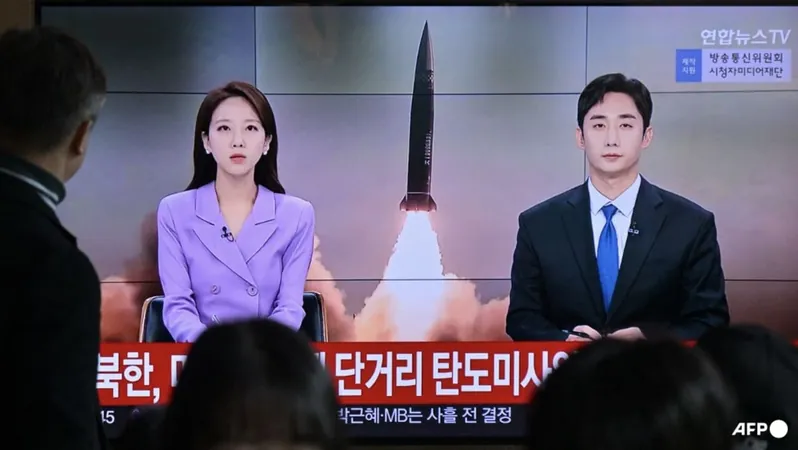
North Korea Launches Ballistic Missiles Days Before U.S. Elections - What It Means for Global Stability
2024-11-05
Author: Jia
SEOUL: In a provocative move ahead of the U.S. presidential election, North Korea launched a series of short-range ballistic missiles on November 5. This marks the second missile test conducted by Pyongyang in just a few days, further escalating tensions in the region.
Seoul's Joint Chiefs of Staff confirmed the launches occurred around 7:30 AM, with several missiles fired into waters east of the Korean Peninsula. In response, South Korea has ramped up its military surveillance and alertness, coordinating closely with allies Japan and the U.S. to monitor any further developments.
The Japanese Prime Minister's office corroborated the missile launches, labeling them as "suspected ballistic missile" actions by North Korea. Just last Thursday, North Korea claimed to have successfully test-fired its most advanced intercontinental ballistic missile (ICBM), the Hwasong-19, a solid-fuel weapon that has raised alarms internationally.
The timing of these tests is particularly noteworthy, as they coincide with growing concerns over North Korea's alleged military support to Russia amid its ongoing conflict with Ukraine. Just hours before the missile launches, U.S. and South Korean defense officials expressed concerns over the alleged deployment of North Korean troops in Russian uniforms for potential battlefield action in Ukraine.
In a show of solidarity, South Korea, Japan, and the United States conducted a joint air drill on November 3. This exercise involved the mobilization of the U.S.'s B-1B bomber and fighter jets from both South Korea and Japan. Such military collaborations often provoke strong reactions from Pyongyang, which views them as rehearsals for invasion.
Kim Yo Jong, sister of North Korean leader Kim Jong Un, has criticized these drills, calling them an "aggressive and hostile action" and reaffirming the necessity for Pyongyang to enhance its nuclear capabilities. In a statement released through state media, she warned that any disruption of the balance of power in the region could lead to war.
Experts suggest these recent missile tests may be a strategic attempt by North Korea to divert attention from its troop deployments to Russia or to position itself on the international agenda, particularly as the U.S. election approaches. Tensions are compounded by allegations that North Korea has been supplying arms to Russia, allowing Moscow to bolster its military efforts in Ukraine.
Amidst these developments, South Korea is contemplating its response, potentially shifting its longstanding policy against sending weapons to active conflict zones - a decision fueled by its status as a significant arms exporter.
While North Korea has denied these troop movements, the rhetoric and military posturing indicate that the geopolitical landscape is becoming increasingly complex and perilous. As we head closer to the U.S. elections, the eyes of the world remain firmly fixed on both Pyongyang's and Washington's next moves. How will this escalation impact global stability? Stay tuned.




 Brasil (PT)
Brasil (PT)
 Canada (EN)
Canada (EN)
 Chile (ES)
Chile (ES)
 España (ES)
España (ES)
 France (FR)
France (FR)
 Hong Kong (EN)
Hong Kong (EN)
 Italia (IT)
Italia (IT)
 日本 (JA)
日本 (JA)
 Magyarország (HU)
Magyarország (HU)
 Norge (NO)
Norge (NO)
 Polska (PL)
Polska (PL)
 Schweiz (DE)
Schweiz (DE)
 Singapore (EN)
Singapore (EN)
 Sverige (SV)
Sverige (SV)
 Suomi (FI)
Suomi (FI)
 Türkiye (TR)
Türkiye (TR)